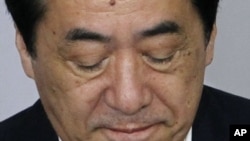Japan will soon see its seventh prime minister in a span of five years. In a widely anticipated move, Prime Minister Naoto Kan has announced he will be resigning as soon as his party selects a new leader on Monday.
Japan faces serious social and economic challenges as it recovers from this year’s unprecedented natural and nuclear disasters.
The unpopular Japanese prime minister has bowed to the inevitable.
Kan on Friday made good on his promise to resign after less than 15 months in power. He announced his exit expressing hope his successor will be able to stay in officer longer than he could.
In remarks at the start of a news conference broadcast live, Kan told the nation that he believes during his one year and three months in office his Cabinet made progress on tax reform, other social policies and helped Japan revive from the devastating March 11 natural disaster and subsequent nuclear accident.
Kan faced rising criticism following the March 11 disaster because of his government’s perceived insufficient response to it.
The magnitude 9.0 earthquake triggered a historic tsunami. The natural disaster left 20,000 dead or missing. It also was the catalyst for the meltdown of reactors at the Fukushima nuclear power plant.
The tragedies put Japanese politics on hold and postponed a resignation seen as inevitable even prior to March 11.
Kan, in what is likely his final news conference as prime minister, acknowledged what he called his inabilities to sufficiently respond in the wake of the reactor meltdowns.
Kan created further debate about his leadership by pushing, as a weakened head of government, a plan to phase out nuclear power in wake of the Fukushima radiation leaks.
Japan has few natural resources and relies on imports of fossil fuels and nuclear plants to power the world’s third largest economy.
Kan was nearly forced out of office in June but survived a parliamentary no confidence motion supported by many in his own party.
As part of a deal to stave off his immediate removal from office, Kan agreed to resign later. But critics accused him of stubbornly clinging to power, as he insisted first that several pieces of legislation be approved before his departure.
The final two pieces of legislation - bills dealing with issuance of bonds and renewable energy - were approved Friday. That removed the last barriers Kan had put in place blocking his immediate resignation.
He quickly then arranged to appear before his fellow Democratic Party of Japan lawmakers to announce he was stepping down as their leader.
The DPJ is to choose his successor Monday with voting limited to its nearly 400 lawmakers. The following day the Parliament will select a prime minister with the Democrats’ candidate ensured victory because of their control of the Lower House.
The brief internal party campaign among those jockeying to succeed Kan begins Saturday. At least four lawmakers will be contesting the post, including former Foreign Minister Seiji Maehara - considered the public favorite - and the current Finance Minister, Yoshihiko Noda. A key party powerbroker, however, is reported to be backing Trade Minister Banri Kaieda.
The party, which was formed in 1998 and took power less than two years ago, faces internal turmoil and the next leader may experience only a short tenure.
Many analysts predict a national election will be called next year and could allow the opposition conservatives, the Liberal Democratic Party, to return to power. The LDP has governed Japan for most of the post-World War II era.










